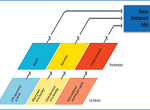 By Kyong Mazzaro
By Kyong Mazzaro
In one of his classic studies on cooperation and competition, Morton Deutsch noted that “individuals who are cooperatively rather than competitively oriented to one another showed such tendencies as more coordination of efforts, more diversity in amount of contributions per member, more subdivision of activity, more achievement pressure”. In other words, cooperation aids in building mutual trust among individuals and in turn can aid in building social capital, efficiency and collaboration.
In the literature on social capital, trust has also been studied from a more macro perspective. Its positive effects on economic growth, for example, evidence the imperative need to underline the economic importance of social phenomena such as cooperation and trust.
Building on this growing interest in studying the social roots of economic growth, recent research has examined the connection between social trust and Human Development. Unlike economic growth, the United Nations Human Development Index (HDI) includes not only data on GDP growth, but also sociopolitical aspects of development such as life expectancy at birth, adult literacy rate, and school enrollment ratios.
Based on HDI fluctuations and national trust scores of 86 countries between 1980 and 2005, results showed that there is an association between trust and the speed with which countries have developed in terms of wealth, education, and health. However, it was also found that these effects are stronger in non-democratic countries, were public goods such as education and health can be used to appeal and appease voters.
These results show that both the economic and non-economic effects of social trust are relevant to the study of development, and can be an interesting subject for future research.
Deutsch, M. Cooperation and trust: Some theoretical notes. In Jones, M. R. (Ed), Nebraska Symposium on Motivation, Oxford, England: Nebraska Press, 275-320.
Ozcan, B, and Bjornskov, C. (2011). Social trust and human development. Journal of Socio-Economics 40(6): 753–762.